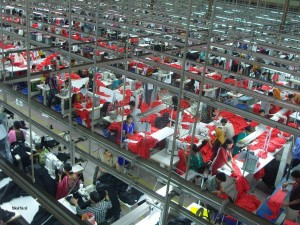Our world today is more interconnected than ever. One major expression of our interconnectedness is the global economy: the goods and services we purchase are often produced in far-off places, and the inevitable waste that is a byproduct of our current economy also has global impacts (see here for one example).
The deaths of over 1000 Bangladeshis in two recent but separate garment factory disasters is an awful reminder of how the cheap goods we buy are often produced at great price.
Saturday, May 11 is World Fair Trade Day. A press release titled “Ten Thousand Villages, Nation’s Largest Fair Trade Retailer Weighs In on Garment Factory Collapse in Bangladesh: A Call for Consumers to Exercise Their Purchasing Power” and published in The Wall Street Journal states, “As the death toll from the garment factory building collapse near Dhaka, Bangladesh reaches 900, American consumers should be asking themselves this very important question: ‘Where do the goods I purchase come from?’ This Saturday, May 11, is World Fair Trade Day — a day dedicated to raising awareness about how our purchases have the potential to profoundly impact the lives of women and men in developing countries. . . So, the next time you are standing in front of a table of colorful $20 shorts, you should remember the factory in Dhaka… and the owner who forced his workers to enter the building knowing full well that the structure had visible cracks and was unsafe. American consumers will pay $20 for those Joe Fresh shorts, the tags visible in the rubble after the building collapse; meanwhile, the men and women who earned little more than $38 a month to make those shorts. . .paid the ultimate price. As Americans, we know this is unacceptable… and it should make us stop and think about where we choose to spend our money.”
